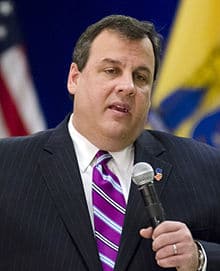New Jersey governor Chris Christie has decided that he is no longer willing to cooperate with other states in reducing greenhouse gas emissions. Christie announced this week that his state will be pulling out of a program with ten other Northeastern states that aimed to reduce carbon pollution and institute a cap-and-trade program among the states.
In an announcement on his decision, Christie declared the program – which has been in place for almost 8 years – to be a complete failure that has done nothing to help reduce greenhouse gas emissions, and that the program is hurting job creation in his state.
The Associated Press wrote the following on the program and Christie’s decision:
The Northeastern pact sets limits on carbon dioxide emissions by fossil fuel-burning power plants and requires them to buy permits to release such gases. The permits can be bought and sold among plants, giving them a financial incentive to operate more cleanly.
The cap-and-trade pact “does nothing more than tax electricity, tax our citizens, tax our businesses with no discernible or measurable impact upon our environment,” Christie said. Residential customers in states that participate in the pact paid an average of about 73 cents extra on their monthly electric bill to fund the program.
The nine remaining states in the program have made it clear that they will be continuing the program, known as the Regional Greenhouse Gas Initiative, even without New Jersey on board.
In spite of Christie’s accusations that the program is a “failure,” New Jersey Sierra Club director Jeff Tittel says that the program has reduced electric utility emissions by 10% over the last two years, and has created as many as 18,000 jobs in the Northeast, bringing in an estimated $2.3 billion in direct economic benefits from the Initiative.
Christie campaigned for office as a candidate that would put the environment first, and said he would continue to push for renewable energy production in New Jersey. These promises earned him the endorsement of the New Jersey Environmental Federation, making him the first Republican in three decades that the group endorsed. Christie repeatedly hammered incumbent Jon Corzine as being harmful to the environment in New Jersey, saying that Corzine failed to clean up toxic waste sites in the state and that he allowed special interests to have too much influence in the Corzine administration.
But despite his strong rhetoric, Christie has been anything but a friend to the environment. He even campaigned (after the environmental endorsement) on a pledge to cut staff and funding for the New Jersey Department of Environmental Protection, saying that the agency was too big and took too long to grant permits to big business.
His record before taking office isn’t any better. He once worked as a lobbyist on behalf of the energy industry in New Jersey, working with state officials to allow more energy exploration in the state.
Christie’s withdrawal from the Regional Greenhouse Gas Initiative is just the latest in a long line of environmental attacks from the Republican governor. His campaign promises continue to ring hollow as he unleashes his assault on the New Jersey environment.
Subscribe to our newsletter
Stay up to date with DeSmog news and alerts






